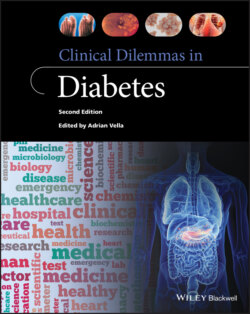Читать книгу Clinical Dilemmas in Diabetes - Группа авторов - Страница 51
Conclusions
ОглавлениеToday, one of the therapeutic goals in T1D is the preservation of the residual C‐peptide secretion that is detected in a significant percentage of patients at diagnosis and which potentially may influence the clinical course of the disease.
Several studies have been demonstrated that residual C‐peptide secretion, after T1D diagnosis, depends on genetic factors, the patient's age at the diabetes diagnosis, the number of anti‐islet antibodies, and the residual C‐peptide secretion. In the same way, intensive insulin therapy and immunomodulators drugs may be useful in this direction.
The ultimate goal of any therapeutic intervention is to prevent or reverse T1D by abrogation of pathogenic autoreactivity and by preservation or restoration of the β‐cell mass and function to physiologically sufficient levels to maintain stable glucose control. Early diagnosis of T1D is crucial if we want to restore and to save β‐cell mass. Different trials using antigen‐specific or non‐specific interventions have shown some benefit in modulation of the autoimmune process and in preventing the loss of insulin secretion in the short term after early diagnosis of T1D.
Unfortunately, there are still limitations to current strategies, including a lack of suitable markers to predict and monitor the success of interventions, uncertainty about the long‐term adverse effects or the duration of treatment effect and the feasibility of restoration of β‐cell mass. Moreover, we should remember that T1D is a heterogeneous disease with an age at onset spanning from childhood to adult age.
Ideally, the interventions would be specific for T1D, free of adverse effects, and effective prior to disease onset, with long‐term and clinically meaningful improvements over standard therapies. The success of these approaches will eventually be evaluated by their impact on glycemic control as this is the definitive determinant of long‐term outcome of the disease.
In conclusion we can affirm that early diagnosis of T1D is very valuable and is not a Pyrrhic victory. Hopefully a better comparison would be with the encounter of David and Goliath, where early immune intervention dramatically changes the clinical course of T1D.
